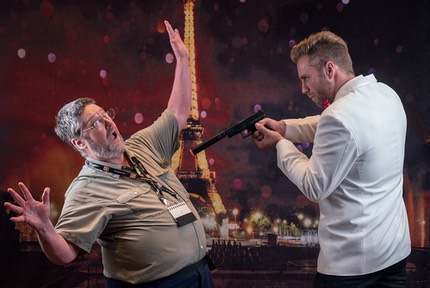
The camera makers have fixed your problems. But have you fixed any, yourself?
I'm old enough to say that I started in the do-it-all-yourself world when it comes to photography. Manual exposure (no built-in camera meter, either), manual focus, manual frame advance, and keep it steady yourself.
Though it came slowly at times, the camera makers have eventually dealt with the biggest user problems, adding automatic exposure, autofocus, fast frame advance, and image stabilization along the way.
One big change came with digital, and with an additional small bump with mirrorless: being able to see what you shot. Film cameras? You saw what you shot hours or days later when you got the film back from processing. DSLRs? You saw what you shot when you pressed the playback button immediately after taking an image (or burst). Mirrorless? You see what you will shoot in the viewfinder on most of the mirrorless cameras now.
So what's your excuse for poor photos?
Modern matrix metering systems—particularly Nikon's—are darned good at analyzing scenes and getting the exposure right. Modern focus systems—particularly Sony's latest—are darned good at finding and following subjects. Modern cameras tend to have at least 5 fps with a decent buffer, and some go to 20 fps with a large buffer. Image stabilization is ubiquitous and most of you are shooting with it always on, so no excuses for shaky handling anymore. And mirrorless cameras are showing you your exposure, white balance, and creative control choices in the viewfinder before you shoot.
So what's your excuse for poor photos?
You'll find plenty on dslrbodies.com that I've written about improving the photographer over the years. This self-help section of that site, for instance, which has the name Improving the Photographer. It's time to now introduce the mirrorless crowd to my same thesis: the gear may be great, but it's the photographer who creates the image.
Every week I deal with the same sets of problems from people sending me emails, and it hasn't let up because of mirrorless cameras. If anything, the number of such emails has increased, mostly due to people having switched systems. Let me cherry pick a few:
- Still Doesn't Focus. Typically, this almost always works out to be not understanding how the focus system of the camera works, the choices it is making, and how to take full control of that so that the camera is doing what you want it to. While others have bemoaned how bad the Nikon Z cameras focus system was, I've been out getting sports and wildlife shots that are perfectly in focus. The difference? I took the time to learn the system and take control of it.
- The Color is Wrong. Nope. The color is as you set the camera to record (or the raw converter to create). A story: one of the first contract-for-hire jobs I took at the start of the DSLR era was from a photographer who couldn't get the color to look right from their new Nikon D1 and their high end digital printer. My minimum booking is a full day, and I'm not cheap. I fixed his problem in 30 minutes. We spent the rest of the day out shooting with me giving a private shooting workshop. The mentality you never want to slip into: "the camera companies know what I want my images to look like." They don't, because most of us are different in that respect. Indeed, there are cultural differences. Every mirrorless camera has a ton of options that allow you to take charge of the color. Do so.
- My Results are Too Noisy. You need to understand the random nature of photons and something called equivalence (and then get exposure optimized, too). I see so many people trying to fight science and math on this one, and they're not going to win. Then they compound their problem by making some bad choices. There's a reason why I carry a 400mm f/2.8 lens and full frame camera in some situations. Expecting a zoom that's f/5.6 to do the same thing on a smaller sensor is simply not connecting with reality.
- It's Blurry. Hey, shouldn't image stabilization take care of that? Nope. If you shoot a moving subject at slow shutter speeds, your subject is rendered as moving in the image. The mechanical shutters in cameras still can impact the image, too, particularly in the 1/15 to 1/125 shutter speed range. And having image stabilization is not an excuse to just handle the camera poorly.
I could go on (and on and on). For today, I won't.
Whatever you think of the camera companies and the features and performance of their gear, they've actually had your back. They fixed your exposure problems. They fixed your focus problems. They fixed your capturing of action moments problems. They fixed your basic hand-holding problems. They fixed your ability to assess what your results might look like while you're shooting. Over 50 or so years, the camera companies have slowly been fixing your biggest problems, one by one.
So what's your excuse for poor photos?